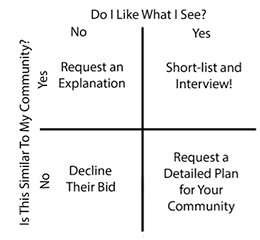7 Mistakes HOAs and Boards Make When Choosing a Landscape Contractor - Sit Down with CEPRA
Choosing a landscape vendor can be a very tough process. Since landscaping is often in the top 3 for "biggest expenses for a community," making sure the money is spent wisely can be a daunting task for many Boards. It is important to go into the bid proposal process with the right mindset. A contractor should provide sustainability, improvement, and supply a complete line of maintenance services to your landscape. These are some of the most common mistakes made by HOA Boards as they are selecting their next landscape vendor:
1. Their expectations and budgets are not in line with one another.
 Having high expectations for your landscape vendor is not only expected, it's welcomed. After all, we pride ourselves in making your vision a reality. That being said, if you are expecting Disney-like service, then be prepared to pay Disney-like prices. Often, the biggest value a vendor brings to their prospective clients in the proposal stage is in setting the right expectations. This ensures that the client will be happy with the service provided at the price given. The right communication is key to make sure your vendor will be successful in your community.
Having high expectations for your landscape vendor is not only expected, it's welcomed. After all, we pride ourselves in making your vision a reality. That being said, if you are expecting Disney-like service, then be prepared to pay Disney-like prices. Often, the biggest value a vendor brings to their prospective clients in the proposal stage is in setting the right expectations. This ensures that the client will be happy with the service provided at the price given. The right communication is key to make sure your vendor will be successful in your community.
2. They didn't budget for major maintenance (such as trees and mulch).
 Does your scope go beyond mowing and trimming? Does it include irrigation, a fertilizer program? It probably does, as that's the standard in today's landscape maintenance contracts. Does it address mulch replenishment, palm pruning or tree trimmings? While this adds to the overall cost, it makes an invaluable difference in the health and longevity of your landscape. If you have an abundance of mature oaks on your property, investing in maintenance prunes are a must to ensure they remain a staple in your community, and to reduce any excessive branch or leaf damage in a heavy storm. Likewise, fresh mulch not only creates a more cohesive look to the community, but it provides both a barrier to weeds and additional nutrients to your shrubs. While it doesn't need to be added to the main agreement, having a reserve of the budget for these major maintenance items helps ensure you'll receive the greatest value from your landscape. An experienced contractor should be able to provide a budgeting tool to aid you in realistically forecasting the properties routine maintenance service costs as well as those extra billing costs that will arise throughout the year.
Does your scope go beyond mowing and trimming? Does it include irrigation, a fertilizer program? It probably does, as that's the standard in today's landscape maintenance contracts. Does it address mulch replenishment, palm pruning or tree trimmings? While this adds to the overall cost, it makes an invaluable difference in the health and longevity of your landscape. If you have an abundance of mature oaks on your property, investing in maintenance prunes are a must to ensure they remain a staple in your community, and to reduce any excessive branch or leaf damage in a heavy storm. Likewise, fresh mulch not only creates a more cohesive look to the community, but it provides both a barrier to weeds and additional nutrients to your shrubs. While it doesn't need to be added to the main agreement, having a reserve of the budget for these major maintenance items helps ensure you'll receive the greatest value from your landscape. An experienced contractor should be able to provide a budgeting tool to aid you in realistically forecasting the properties routine maintenance service costs as well as those extra billing costs that will arise throughout the year.
3. They didn't check the company's reputation.
 A company is only as great as the team in front of you. Some larger and national landscape companies may have fancy reports of impressive clientele; however, these can vary greatly branch to branch. While having a strong back support and training is good, analyzing the work being done on a local level is just as – if not, more – important. Ask about employee training and any certificates or degrees that they hold, as well as the company's membership in professional landscape associations. Be sure to collect a list of at least 3 references from your prospective vendors, and check with them to hear if they are satisfied with the level of service, amount of communication, and overall look of their communities.
A company is only as great as the team in front of you. Some larger and national landscape companies may have fancy reports of impressive clientele; however, these can vary greatly branch to branch. While having a strong back support and training is good, analyzing the work being done on a local level is just as – if not, more – important. Ask about employee training and any certificates or degrees that they hold, as well as the company's membership in professional landscape associations. Be sure to collect a list of at least 3 references from your prospective vendors, and check with them to hear if they are satisfied with the level of service, amount of communication, and overall look of their communities.
4. They didn't check with the references and drive the properties.
 Receiving a list of references is only the first step. Every effort should be made to visit the properties listed in person. When looking at these properties, ask yourself these two questions: Is this property similar in size and scope to my community? And, do I like what I see?
Receiving a list of references is only the first step. Every effort should be made to visit the properties listed in person. When looking at these properties, ask yourself these two questions: Is this property similar in size and scope to my community? And, do I like what I see?
For the first question, it is important that your vendor has experience dealing with a community like yours. If you are an HOA, and all that are listed on your reference sheets are commercial plazas and CDDs, then it may show a gap in expertise specific to your needs. Likewise, if your HOA has over 300 homes, yet your reference sheet only reports communities with a handful of homes (or worse, a similarly-sized community, but several towns over), then it's worth asking if the vendor has a more tailored list of references.
The answer to the second question determines whether it's worth moving forward with the prospective vendor. Do you like the conditions the landscape is in? Does the team being in uniform matter to you? Do the vehicles and equipment look clean and well maintained? If people are working, can you see that they are being safe and efficient? (i.e., wearing PPE and steadily moving throughout the site) This second question also helps qualify the vendor if the communities on their reference sheet are not as similar to yours as you had hoped. If the vendor produces work that you like, but doesn't have a similar community, it's worth asking them to put together a detailed plan on how they expect to be successful in your association.
5. They didn't meet the team.
 While it's great to hear all the wonderful things the sales team has to tell you about their company, you should want to know who will be dealing with your properties directly. The experience of the team will make or break your service. Make an appointment to meet with the local team. This may include the Branch Manager and the Account Manager that will be overseeing your community. It can include any specialty teams, such as the Irrigation Manager or Fertilizer/Pest Manager. If there is an area of landscaping that has been a hot button for your community, see if you can meet with that specific manager and hear their plan. The most successful communities are the ones most comfortable with their landscape team.
While it's great to hear all the wonderful things the sales team has to tell you about their company, you should want to know who will be dealing with your properties directly. The experience of the team will make or break your service. Make an appointment to meet with the local team. This may include the Branch Manager and the Account Manager that will be overseeing your community. It can include any specialty teams, such as the Irrigation Manager or Fertilizer/Pest Manager. If there is an area of landscaping that has been a hot button for your community, see if you can meet with that specific manager and hear their plan. The most successful communities are the ones most comfortable with their landscape team.
6. They didn't look at the contract close enough.
 Most landscape vendors address the same clauses in their fine print. However, the offers in these clauses can vary greatly. Typically, what's being addressed in the fine print are renewals, increases, and cancellations. When you sign the contract, will you be locking into that price for an entire year? Does it renew automatically once the year is done? Are there any increases associated with renewals? If so, how much does that add to the contract, and is that reasonable for the industry? What is the amount of notice required in order to cancel – 30 days, 60 days, or more? Are there any fees associated with canceling? Having these laid out when comparing proposals helps ensure the type of partnership you enter will remain valuable for years – and save you from having to go back out to bid prematurely.
Most landscape vendors address the same clauses in their fine print. However, the offers in these clauses can vary greatly. Typically, what's being addressed in the fine print are renewals, increases, and cancellations. When you sign the contract, will you be locking into that price for an entire year? Does it renew automatically once the year is done? Are there any increases associated with renewals? If so, how much does that add to the contract, and is that reasonable for the industry? What is the amount of notice required in order to cancel – 30 days, 60 days, or more? Are there any fees associated with canceling? Having these laid out when comparing proposals helps ensure the type of partnership you enter will remain valuable for years – and save you from having to go back out to bid prematurely.
7. They were sold solely on price.
 Make sure your bidding vendors are providing a good, quality service for a reasonable price. Is their solution to your landscaping issues what you want or expect? Likewise, beware of the low-ball proposal. If the price is too low, then something is going to suffer as a result of it. In the landscape industry, service is heavily tied to the man-hours allotted for the job. Since the number of hours given to a job is directly correlated to the price, it is a safe assumption that a low-priced proposal is missing the hours needed to properly do the job.
Make sure your bidding vendors are providing a good, quality service for a reasonable price. Is their solution to your landscaping issues what you want or expect? Likewise, beware of the low-ball proposal. If the price is too low, then something is going to suffer as a result of it. In the landscape industry, service is heavily tied to the man-hours allotted for the job. Since the number of hours given to a job is directly correlated to the price, it is a safe assumption that a low-priced proposal is missing the hours needed to properly do the job.
But what if all the proposals you receive are similarly priced? One great solution would be to ask your current landscape providers for a report or estimate on how many hours they will use to service your community. Make sure it lists hours for both summer and winter individually, as communities tend to need fewer hours to maintain their landscapes during the cool season when plants are dormant. Ask yourself, are you satisfied with the amount of service you are receiving for the hours provided? If yes, use that number as a guide. If not, seek a proposal that brings more to the table. Remember, however, that man-hours for the job is just one piece of the puzzle. Be sure to analyze the proposal beyond just the number on the pricing page, and look at the team, experience, references, and unique plan for your community. Price matters, but quality matters more.
Conclusion
Above all, the right vendor will focus on creating a partnership with your community. Look for this as opposed to someone looking for a quick win or to just get the bare minimum done and leave. You want a team who is proactive in their service, is an effective communicator, and puts your community's needs first. Having a quality vendor adds more value to your community than the landscaping alone.
